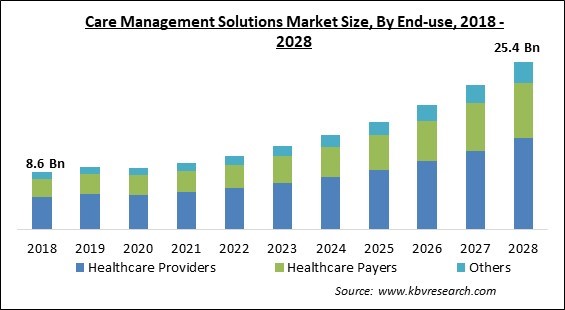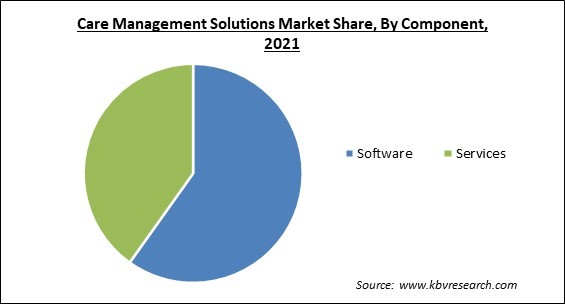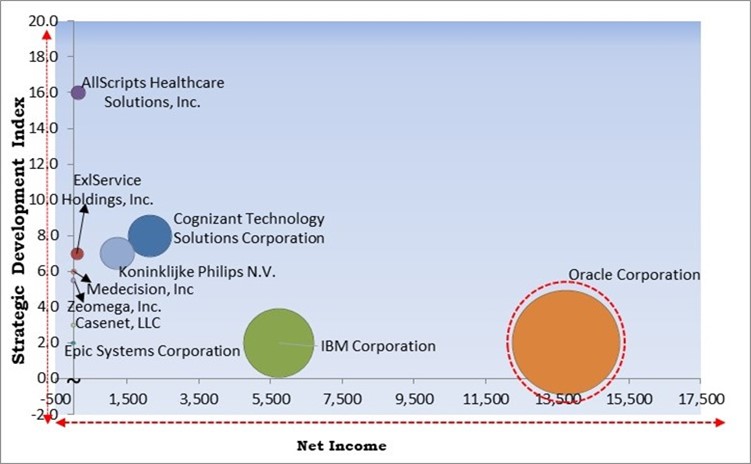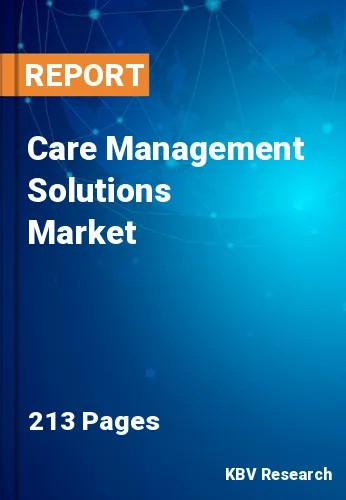The Global Care Management Solutions Market size is expected to reach $25.4 billion by 2028, rising at a market growth of 14.8% CAGR during the forecast period.
Patients who have diseases that are chronic or complex and need assistance managing their health may benefit from care management, which is a complete set of treatments and activities. The overall objective of care management is to enhance the condition of the patient. In addition to these goals, the model seeks to improve care coordination, lower the number of hospital visits, and increase patient participation.

The utilization of care management software can offer healthcare professionals substantial assistance in accomplishing these objectives. The management of comprehensive care requires the participation of a team. Patients, physicians, and other clinicians, as well as patients' careers, need to collaborate in order to assist patients in managing the complexities of their healthcare demands.
The administrative tasks involved in care management, like scheduling appointments, scheduling tests, developing care plans, accessing and sharing reports, patient engagement, administering treatments, and so on, can be streamlined and digitized with the help of software solutions for care management.
In other words, a physician or group of physicians can utilize care management platforms to coordinate clinical activities. This can be done in order to improve the quality of medical care that is provided. Inadequacies in the provision of evidence-based care or a precipitating occasion like hospitalization can also point to the requirement for continuity of care.
Following the appropriate identification of the need for CM services, patients and caregivers should be engaged in shared decision-making to ascertain which CM services would be the most suitable to address clients' modifiable risks and optimize their health. This should take place after the need for care management services has been appropriately identified.
The COVID-19 pandemic brings about a protracted decline in the healthcare industry. Regardless of the community, COVID-19 was a disaster for the world's largest economies, especially the healthcare sector. Important parties are still making changes to their plans in response to the rapidly changing circumstances. The long-term implications of COVID-19 are anticipated to be significant in the healthcare sector. Until the crisis is resolved, countries and important stakeholders would need to focus on reform. In various nations, the rising COVID-19 prevalence has increased the necessity for precise diagnosis and treatment tools.
A key element of the efficient delivery of primary care and care management is the alignment of care management with population requirements, which fosters supportive, trustworthy relationships between healthcare professionals and patients. Care management solutions are quickly transferring risk from the government's control to that of healthcare providers, commercial payers, and others. All around the globe, a number of initiatives are now being implemented to transfer the risk from healthcare payers to providers.
The healthcare sector has to choose between pursuing cutting-edge technology's competitive advantage and the attendant danger of unpredictability. A trade-off must be made between implementing enough technology advancements to deliver quality services at a lower cost and controlling the risks and uncertainties they entail. The increased use of big data and its enormous impact have undoubtedly pushed the healthcare industry toward patient-centric care.
An effective IT infrastructure and IT support both inside the company and at the solution provider's end are necessary for the use of care management solutions. For clinical operations to run smoothly and care management solutions to interface with servers and networks at optimal speeds, technical assistance is a constant requirement in healthcare organizations. The production of screen loads results from the poor server or network maintenance, which slows down the clinical process.
Based on component, the care management solutions market is segmented into services and software. The services segment acquired a substantial revenue share in the care management solutions market in 2021. The rise of the service sector is being fueled by an increase in service providers as well as providers outsourcing care management. The care management services is emerging as the key means of health management.

On the basis of mode of delivery, the care management solutions market is fragmented into web-based, cloud-based and on-premise. A helpful supplement in the treatment of patients with improperly managed diabetes may be web-based care management. A web-based software package created for payers that provides transparency into the delivery of care and identifies the optimum delivery methods. The market is being driven in this segment as a result of rising number of web based care management platform providers.
By end-user, the care management solutions market is divided into healthcare providers, healthcare payers and others. In 2021, the healthcare providers segment registered the highest revenue share in the care management solutions market. The segment's growth is being fueled by growing patient demand for patient-centered care, higher healthcare quality, an expanding patient base, and an increase in the need for quicker services. Increased strategic activities by key competitors and the presence of well-developed hospitals are expected to fuel market expansion.
| Report Attribute | Details |
|---|---|
| Market size value in 2021 | USD 10.1 Billion |
| Market size forecast in 2028 | USD 25.4 Billion |
| Base Year | 2021 |
| Historical Period | 2018 to 2020 |
| Forecast Period | 2022 to 2028 |
| Revenue Growth Rate | CAGR of 14.8% from 2022 to 2028 |
| Number of Pages | 213 |
| Number of Tables | 344 |
| Report coverage | Market Trends, Revenue Estimation and Forecast, Segmentation Analysis, Regional and Country Breakdown, Competitive Landscape, Companies Strategic Developments, Company Profiling |
| Segments covered | Component, Mode of Delivery, End-use, Region |
| Country scope | US, Canada, Mexico, Germany, UK, France, Russia, Spain, Italy, China, Japan, India, South Korea, Singapore, Malaysia, Brazil, Argentina, UAE, Saudi Arabia, South Africa, Nigeria |
| Growth Drivers |
|
| Restraints |
|
Region wise, the care management solutions market is analyzed across North America, Europe, Asia Pacific and LAMEA. In 2021, the North America region led the care management solutions market by generating the highest revenue share. The region's expansion is linked to healthcare providers' increasing embrace of patient care solutions that help them achieve their objectives of lower costs and higher quality care. Additionally, the regional market is growing as a result of rising technical improvements and cloud-based software use.
Free Valuable Insights: Global Care Management Solutions Market size to reach USD 25.4 Billion by 2028

The major strategies followed by the market participants are Product Launches. Based on the Analysis presented in the Cardinal matrix; Oracle Corporation is the major forerunner in the Care Management Solutions Market. Companies such as IBM Corporation, Cognizant Technology Solutions Corporation and Koninklijke Philips N.V. are some of the key innovators in Care Management Solutions Market.
The market research report covers the analysis of key stake holders of the market. Key companies profiled in the report include AllScripts Healthcare Solutions, Inc., Epic Systems Corporation, Cognizant Technology Solutions Corporation, ExlService Holdings, Inc., Koninklijke Philips N.V., Oracle Corporation (Cerner Corporation), Zeomega, Inc., Medecision, Inc. (Health Care Service Corporation), IBM Corporation, and Casenet, LLC (Zyter, Inc.)
By End-use
By Component
By Mode of Delivery
By Geography
The global Care Management Solutions Market size is expected to reach $25.4 billion by 2028.
Various Initiatives Are Being Taken To Shift Risk To Providers From Payers are driving the market in coming years, however, Shortage Of Workforce restraints the growth of the market.
AllScripts Healthcare Solutions, Inc., Epic Systems Corporation, Cognizant Technology Solutions Corporation, ExlService Holdings, Inc., Koninklijke Philips N.V., Oracle Corporation (Cerner Corporation), Zeomega, Inc., Medecision, Inc. (Health Care Service Corporation), IBM Corporation, and Casenet, LLC (Zyter, Inc.)
The expected CAGR of the Care Management Solutions Market is 14.8% from 2022 to 2028.
The Software segment acquired maximum revenue share in the Global Care Management Solutions Market by Component in 2021 thereby, achieving a market value of $14.9 billion by 2028.
The North America market dominated the Global Care Management Solutions Market by Region in 2021, and would continue to be a dominant market till 2028; thereby, achieving a market value of $10 billion by 2028.
Our team of dedicated experts can provide you with attractive expansion opportunities for your business.

